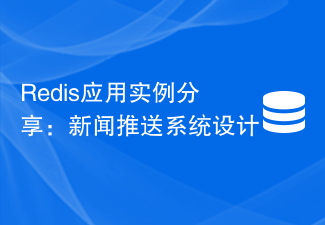 Backend Development
Backend Development PHP Tutorial
PHP Tutorial How to design a system that supports social learning and user interaction in online question answering
How to design a system that supports social learning and user interaction in online question answering
How to design a system that supports social learning and user interaction in online question answering
With the development of the Internet, online learning and online question answering have become a popular learning method. However, traditional online question-answering systems often only provide basic question-answering functions and lack the features of social learning and user interaction. In order to better meet the learning needs of students, we need to design a system that supports social learning and user interaction in online question answering.
Such a system should have the following key functions: interaction between students, competition between students, interaction between students and teachers, and students’ feedback on topics, etc. Below, I will describe how to design such a system and give specific code examples.
- Interaction among students
Interaction between students is a very important part of the learning process. In the answering system, some social functions can be added, such as friend relationships between students, dynamic messages, message comments, etc. These functions can be achieved through the following code:
class Student:
def __init__(self, name):
self.name = name
self.friends = []
self.messages = []
def add_friend(self, friend):
self.friends.append(friend)
def send_message(self, message):
for friend in self.friends:
friend.receive_message(message)
def receive_message(self, message):
self.messages.append(message)
def comment_message(self, message, comment):
message.comments.append(comment)
class Message:
def __init__(self, content):
self.content = content
self.comments = []
def add_comment(self, comment):
self.comments.append(comment)
class Comment:
def __init__(self, content):
self.content = contentUsing the above code, students can add each other as friends, send messages, receive messages, and comment on messages. In this way, students can communicate and interact with each other through the question answering system.
- Competition among students
Competition can stimulate students' enthusiasm for learning. In the question answering system, you can set some question challenges to allow students to compete with each other. The following is a sample code that implements a simple battle function:
class Quiz:
def __init__(self, question, options, answer):
self.question = question
self.options = options
self.answer = answer
class Game:
def __init__(self, players):
self.players = players
self.quiz = None
def start_game(self, quiz):
self.quiz = quiz
def submit_answer(self, player, answer):
if self.quiz.answer == answer:
player.score += 1
class Player:
def __init__(self, name):
self.name = name
self.score = 0In the above code, the Quiz class represents a question, including question content, options and answers. The Game class represents a battle game. You can specify the players participating in the game and start the game through the start_game method. The submit_answer method is used to submit answers. The Player class represents a player, including the player's name and score.
Through the above code, students can participate in battles and competitions, and improve points and rankings by answering questions.
- Interaction between students and teachers
Interaction between students and teachers is very important for students' learning. In the question answering system, students can provide functions such as asking questions to the teacher, requesting answers, and the teacher giving answers. The following is a sample code that implements the interaction between students and teachers:
class Teacher:
def __init__(self, name):
self.name = name
def answer_question(self, question):
# 这里可以根据具体的业务逻辑进行回答
class Student:
# 省略其他代码
def ask_question(self, teacher, question):
teacher.answer_question(question)
teacher = Teacher('张老师')
student = Student('小明')
student.ask_question(teacher, '为什么地球是圆的?')Through the above code, students can ask questions to the teacher, and the teacher can answer and interact with the students based on the specific situation.
- Students’ feedback on the questions
Students’ feedback on the questions is crucial to improving the quality of the questions and the learning effect. In the question-answering system, students can be provided with functions such as scoring, commenting, and providing feedback on questions. The following is a sample code that implements the student feedback function on the question:
class Question:
def __init__(self, content):
self.content = content
self.rating = 0
self.comments = []
def rate_question(self, rating):
self.rating = rating
def add_comment(self, comment):
self.comments.append(comment)
question = Question('1+1等于多少?')
question.rate_question(5)
question.add_comment('这个问题很有趣!')
student = Student('小明')
student.rate_question(question, 4)
student.comment_question(question, '题目有点简单。')
class Student:
# 省略其他代码
def rate_question(self, question, rating):
question.rate_question(rating)
def comment_question(self, question, comment):
question.add_comment(comment)Through the above code, students can rate and comment on the question, as well as provide suggestions for improvement.
To sum up, designing a system that supports social learning and user interaction in online question answering needs to consider the interaction between students, the competition between students, the interaction between students and teachers, and the interaction between students. Question feedback and other functions. I hope the above code examples can help you better design and implement such a system.
The above is the detailed content of How to design a system that supports social learning and user interaction in online question answering. For more information, please follow other related articles on the PHP Chinese website!
 如何设计一个支持多语言的在线答题系统Sep 25, 2023 pm 12:10 PM
如何设计一个支持多语言的在线答题系统Sep 25, 2023 pm 12:10 PM如何设计一个支持多语言的在线答题系统摘要:随着全球化进程的加快,越来越多的人需要学习和掌握多种语言。设计一个支持多语言的在线答题系统,能够帮助用户在不同语言环境下进行学习和练习。本文将介绍如何设计这样一个系统,并提供具体的代码示例。一、系统设计用户信息管理:系统需要支持多用户注册和登录,因此需要设计一个用户信息管理模块。用户信息包括用户名、密码、个人资料等。
 PHP商城开发中的供应链管理系统设计与实现May 23, 2023 am 08:37 AM
PHP商城开发中的供应链管理系统设计与实现May 23, 2023 am 08:37 AMPHP商城开发中的供应链管理系统设计与实现随着电子商务的快速发展,网络购物已经成为人们生活中的一部分。作为一项复杂的商业活动,电子商务不仅涉及到产品的销售,还需要考虑到供应链的管理问题。供应链管理是对供应商、制造商、批发商、零售商等所有参与者之间的流程、信息和物资的整体管理。在电子商务中,供应链管理的效率往往直接影响到商城的运营和用户体验。本文将探讨PHP商
 利用Discuz论坛构建活跃社群,提升用户互动Mar 03, 2024 am 09:51 AM
利用Discuz论坛构建活跃社群,提升用户互动Mar 03, 2024 am 09:51 AM构建一个活跃的社群对于一个论坛来说是至关重要的,而Discuz作为国内较为流行的论坛系统之一,具有丰富的功能和灵活的定制性,能够帮助论坛管理员轻松实现用户互动的提升。本文将介绍如何利用Discuz论坛构建活跃社群,并提供一些具体的代码示例,帮助论坛管理员更好地运营社群。首先,要构建一个活跃的社群,论坛管理员需要关注以下几个方面:一、社区氛围营造设计鼓励用户互
 PHP实现在线问答系统的开发与设计Jun 18, 2023 pm 04:02 PM
PHP实现在线问答系统的开发与设计Jun 18, 2023 pm 04:02 PM随着互联网技术的发展,越来越多的人开始使用在线问答系统,该系统可以帮助用户在特定的领域获取有价值的信息,并与其他用户进行交流。在线问答系统的开发需考虑到多种技术要素,其中之一是编程语言。本文将详细介绍如何使用PHP编程语言进行在线问答系统的开发与设计。系统需求分析在进行系统开发之前,需要对系统需求进行详细的分析。在分析系统需求的过程中,主要包括以下方面:(1
 PHP实现HRM系统的开发与设计Jun 18, 2023 pm 01:42 PM
PHP实现HRM系统的开发与设计Jun 18, 2023 pm 01:42 PM随着现代企业的发展,人力资源管理越来越成为企业的关键要素之一。提高人力资源管理效率和水平成为企业持续发展的关键之一。而HRM系统无疑是实现这一目的的最佳方案之一。HRM系统是一种集成性较高的企业管理软件,它包含了企业人力资源管理的各个方面,涉及员工基本信息、薪酬、培训、考核、招聘、福利、绩效评估等方面。尤其在面对跨国企业和大型企业,HRM系统更具必要性。在H
 如何设计一个支持在线答题中的学习路径规划的系统Sep 24, 2023 pm 07:10 PM
如何设计一个支持在线答题中的学习路径规划的系统Sep 24, 2023 pm 07:10 PM如何设计一个支持在线答题中的学习路径规划的系统随着互联网的发展和智能手机的普及,在线学习已经成为了人们获取知识的主要方式之一。然而,对于学习者来说,面对大量的学习资源,如何有效地选择学习路径和规划学习进程是一个挑战。为了解决这个问题,设计一个支持在线答题中的学习路径规划的系统是非常有必要的。本文将介绍一个用于在线答题中学习路径规划的系统的设计思路,并提供一些
 Redis应用实例分享:新闻推送系统设计Jun 20, 2023 am 10:04 AM
Redis应用实例分享:新闻推送系统设计Jun 20, 2023 am 10:04 AMRedis作为一种高性能的内存数据存储系统,一直被广泛应用于互联网领域,尤其是在缓存和消息队列方面应用较为广泛。而在新闻推送系统的设计中,Redis也扮演着重要的角色。本文将结合具体的案例,分享一下Redis在新闻推送系统的应用实例。一、需求分析在设计新闻推送系统时,首要的需求是快速、准确、可靠地向用户推送最新的新闻内容。具体来说,需要解决以下几个问题:1.
 为什么Java架构师需要深入了解系统设计和架构原理?Dec 23, 2023 am 09:09 AM
为什么Java架构师需要深入了解系统设计和架构原理?Dec 23, 2023 am 09:09 AM为什么Java架构师需要深入了解系统设计和架构原理?随着信息技术的飞速发展,软件架构设计已经成为了企业开发领域中的一个非常重要的环节。在这个领域中,Java架构师能够通过深入了解系统设计和架构原理来提高自身的竞争力和水平。下文将探讨为什么Java架构师需要对系统设计和架构原理进行深入了解。首先,Java架构师需要深入了解系统设计和架构原理是因为系统设计和架构


Hot AI Tools

Undresser.AI Undress
AI-powered app for creating realistic nude photos

AI Clothes Remover
Online AI tool for removing clothes from photos.

Undress AI Tool
Undress images for free

Clothoff.io
AI clothes remover

AI Hentai Generator
Generate AI Hentai for free.

Hot Article

Hot Tools

SAP NetWeaver Server Adapter for Eclipse
Integrate Eclipse with SAP NetWeaver application server.

SublimeText3 Linux new version
SublimeText3 Linux latest version

MinGW - Minimalist GNU for Windows
This project is in the process of being migrated to osdn.net/projects/mingw, you can continue to follow us there. MinGW: A native Windows port of the GNU Compiler Collection (GCC), freely distributable import libraries and header files for building native Windows applications; includes extensions to the MSVC runtime to support C99 functionality. All MinGW software can run on 64-bit Windows platforms.

WebStorm Mac version
Useful JavaScript development tools

VSCode Windows 64-bit Download
A free and powerful IDE editor launched by Microsoft





